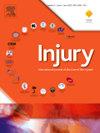Imaging findings in penetrating injuries in the paediatric population – Experience from a major trauma Centre
IF 2.2
3区 医学
Q3 CRITICAL CARE MEDICINE
Injury-International Journal of the Care of the Injured
Pub Date : 2025-01-01
DOI:10.1016/j.injury.2024.111760
引用次数: 0
Abstract
Objective
The primary objective of this study is to assess common sites of injury and the associated imaging findings in penetrating injuries. We pay particular attention to gluteal, anterior abdominal wall and junctional zone injuries. The aim is to highlight areas of diagnostic uncertainty and discrepancy between imaging and surgical findings, to improve review areas in trauma reporting.
Methods
A retrospective, observational study reviewing all paediatric admissions to the emergency department of a major trauma Centre with a penetrating injury, from 2015 to 2019.
Results
Gluteal penetrating injuries are by far the most commonly sustained injury in the adolescent population, making up over 1/3 of cases. The vast majority of these cases sustained superficial injuries or shallow intramuscular haematomas, however in a small group (15%), serious vascular or rectal injuries were demonstrated on dual phase CT, requiring emergent surgical or endovascular treatment. Penetrating injuries to the anterior abdominal wall and junctional zone are less common but are associated with higher morbidity, with 43% of cases demonstrating solid organ or bowel injury. These cases also lead to an increased degree of diagnostic uncertainty.
Conclusion
Gluteal injuries are common and although the overall morbidity of these cases is low, these patients are at risk of serious and life threatening consequences such as vascular and rectal injury and it is imperative that these complications are considered and ruled out via dual phase CT or direct visualization. Anterior abdominal wall and junctional zone injuries are less common, but lead to greater morbidity and also greater diagnostic uncertainty. The use of other salient findings as described in this report can aid diagnostic accuracy and reduce discrepancies.
儿科穿透伤的影像学发现--一家大型创伤中心的经验。
研究目的本研究的主要目的是评估穿透性损伤的常见受伤部位和相关影像学检查结果。我们特别关注臀部、前腹壁和交界区损伤。目的是突出诊断不确定性和影像学与手术结果不一致的领域,以改进创伤报告中的审查领域:一项回顾性观察研究,回顾了 2015 年至 2019 年期间一家大型创伤中心急诊科收治的所有穿透性损伤的儿科患者:臀部穿透伤是迄今为止青少年人群中最常见的损伤,占病例总数的三分之一以上。这些病例中绝大多数都是表皮损伤或浅层肌肉内血肿,但也有一小部分病例(15%)在双相位 CT 上显示出严重的血管或直肠损伤,需要紧急手术或血管内治疗。前腹壁和交界区的穿透伤较少见,但发病率较高,43%的病例显示有实体器官或肠道损伤。这些病例也增加了诊断的不确定性:结论:臀部损伤很常见,虽然这些病例的总体发病率较低,但这些患者有可能出现严重和危及生命的后果,如血管和直肠损伤,因此必须通过双相 CT 或直接观察来考虑和排除这些并发症。前腹壁和交界区损伤不太常见,但发病率更高,诊断的不确定性也更大。使用本报告中描述的其他突出检查结果有助于提高诊断准确性并减少差异。
本文章由计算机程序翻译,如有差异,请以英文原文为准。
求助全文
约1分钟内获得全文
求助全文
来源期刊
CiteScore
4.00
自引率
8.00%
发文量
699
审稿时长
96 days
期刊介绍:
Injury was founded in 1969 and is an international journal dealing with all aspects of trauma care and accident surgery. Our primary aim is to facilitate the exchange of ideas, techniques and information among all members of the trauma team.

 求助内容:
求助内容: 应助结果提醒方式:
应助结果提醒方式:


